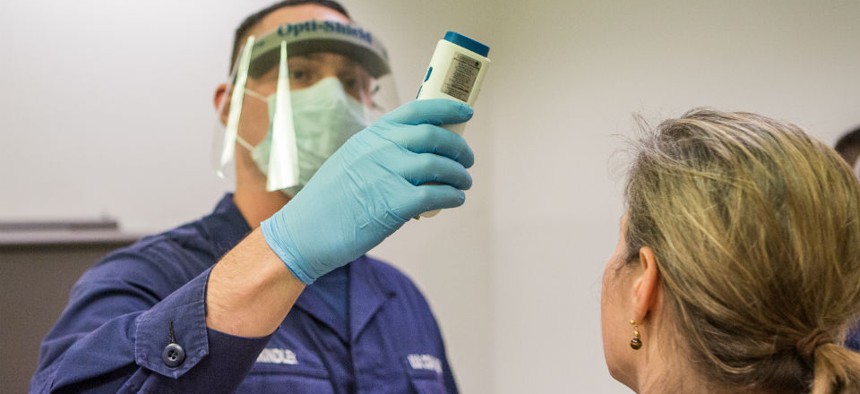
A Coast Guard employee working with CBP's Office of Field Operations checks the temperature of a traveler at Dulles airport who has recently been to Guinea, Sierra Leone or Liberia. Josh Denmark/ Customs and Border Protection
Why the New Ebola Airport Screenings Won't Work
Tighter travel restrictions were announced Tuesday, but the power of these preventive measures is limited.
The Homeland Security Department announced new travel restrictions for travelers from Ebola-stricken countries Tuesday, but the measures will likely do little to keep the virus out of the United States.
All passengers traveling from Liberia, Sierra Leone, and Guinea will now have to come into the U.S. through five major airports: Dulles International Airport in Virginia; Newark Liberty International Airport; John F. Kennedy International Airport in New York; Chicago O'Hare International Airport; and Hartsfield-Jackson Atlanta International Airport.
These airports implemented tighter screening measures for individuals traveling from the three affected countries last week, including taking the temperature of all passengers and submitting them to additional questioning. All travelers whose journeys originated in the three countries will now be subject to these added protocols, Homeland Security Secretary Jeh Johnson wrote in a release Tuesday.
Ninety-four percent of the approximately 150 travelers coming to the U.S. each day from the three countries were already entering the country through the five airports with tight screening measures. The new restrictions apply to an additional nine or so passengers.
The new measures will begin Wednesday.
The additional screenings could calm some of the panic that has gripped the U.S. following the diagnosis of the first case of Ebola in the U.S. on September 28, and it's possible they may catch cases before they enter the country. But the nature of the disease limits the power of such preventive measures.
These additional screening protocols would not actually have prevented the entry of Thomas Eric Duncan—who died Oct. 8 from Ebola—into the country.
When Duncan arrived in Dallas on Sept. 20, he had no fever and answered in the negative to questions of whether he had contact with Ebola patients in his native Liberia. He did not begin to develop symptoms until about four days after his arrival.
The 21-day incubation period of the virus means that individuals traveling from the affected countries may have been infected but not yet be experiencing a temperature or other symptoms. On the flip side, many may show a fever and be detained, but not have Ebola.
Of the 36,000 travelers who left the three countries since exit screenings began in August, 77 were stopped due to symptoms such as fever, the CDC said earlier this month. None ended up having Ebola; many were diagnosed with malaria, which is prevalent in West Africa.
Since the additional screening began at U.S. airports last week, 28 individuals were given the public-health assessment, and four were transported to a medical facility, according to data from DHS. No individual screened has tested positive for Ebola.
Historical precedent does not give much hope for the success of airport screening measures against diseases. Studies have shown that similar screenings during the SARS outbreak in 2003, and the influenza (H1N1) pandemic in Japan and Australia in 2009, were not found to be effective at identifying cases.
"It's like looking for a needle in 10,000 haystacks," said Joshua Michaud, associate director of global health policy at the Kaiser Family Foundation. "It's very unlikely that you would find a case through screening measures at the borders."
Despite calls from Republican lawmakers to stop flights from Ebola-stricken countries, top health officials have maintained that a complete travel ban would be detrimental to the fight against Ebola. Officials maintain that the best way to control the spread of the disease is by being able to track who is entering the U.S., as well as contact-tracing to find anyone an infected individual may have been in contact with.
There are currently no direct flights to the U.S. from the West African countries, so trying to stop individuals from entering through other countries would be extremely resource-intensive and ultimately unsuccessful, top health officials say. And such restrictions would harm efforts to stop the epidemic in affected countries.
"The best way to protect ourselves is not to seal off these countries but to provide the kinds of services so the disease is contained there," said CDC Director Thomas Frieden at the beginning of October. "The only way to get to zero risk is to stop it there."







